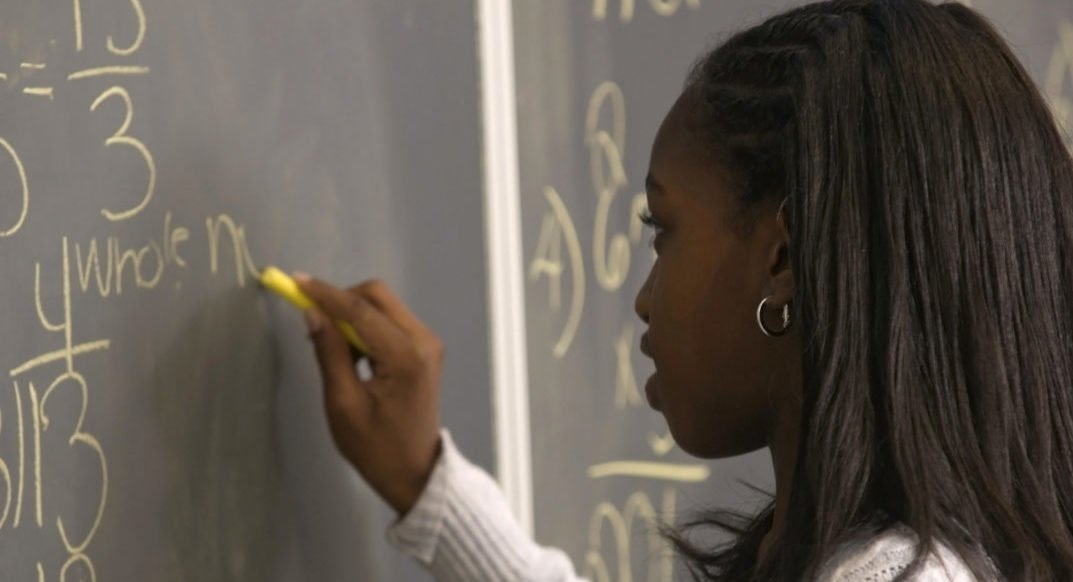Five Guiding Principles for Creating Inclusive Mathematics Environments
Chloe Stroman
As part of the Inclusive Mathematics Environments Early Career Fellowship, 11 exceptional early career scholars, two faculty contributors, and a network of senior scholars who served as mentors reviewed and synthesized decades of research about students’ experiences with and perceptions of mathematics. Their goal was to understand more about creating inclusive environments for students from minoritized and marginalized groups in mathematics in middle childhood through mid-adolescence.
Mathematics, like other disciplines such as history and literature, is inherently cultural. Often, the norms, beliefs, and practices of mathematics education perpetuate existing hierarchies that privilege white, middle- and upper-class students, native English speakers, and boys, while marginalizing groups including Black, Latinx, and Native American students, students from families facing economic disadvantage, students who are multilingual learners, and girls.
Advances in cognitive science and neuroscience suggest that inclusive environments can help create the necessary conditions for learning, and multiple studies in diverse K-16 contexts have shown that students’ concerns about belonging and ability can have a direct, causal effect on their educational outcomes including motivation, persistence on challenging tasks, course grades, test scores, and progression to graduation.
The fellowship, therefore, was grounded in an understanding that learning environments shape students’ opportunities to learn directly, by affording or constraining access to instructional resources, and indirectly, by sending messages to students that shape the beliefs they develop about learning and school.
The papers highlight two common themes that should underpin efforts to transform policies, practices, and norms to build inclusive learning environments. First, students are individuals, so no two students who are marginalized in mathematics education will have the same experience. Second, all students have mathematical knowledge and skills that educators can leverage and all students are experts on their own learning and their own uses of mathematics.
With these themes in mind, insights from across the papers produced through the fellowship suggest five interrelated guiding principles for creating such environments:
- Mathematics educators need critical consciousness. Educators must understand how marginalization and bias are expressed in mathematics environments and work to actively counter these processes via their instructional choices and interactions with students. Examples of what educator critical consciousness can look like in practice include confronting microaggressions, employing complex instruction, explicitly praising the contributions of students who have a minoritized identity in mathematics, or incorporating students’ uses of mathematics outside of school into their classwork.
- Mathematics curriculum should reflect a more expansive view of mathematics, including the history of mathematical concepts, the uses of mathematics in different cultures, and the application of mathematics for understanding current events. Inclusive curricular materials represent the wide range of identities and communities that use mathematics and provide students with copious examples and opportunities to see how mathematical concepts are applied in the real world.
- Mathematics curriculum and instruction should be adaptable so that it is relevant to the specific students in the class. This can take the form of using culturally responsive educational practices, welcoming students’ uses of their preferred language, and engaging students in choosing topics to study using mathematics.
- Mathematics curriculum and instruction should feature meaningful opportunities to engage in collaborative work. Sharing their thinking in peer groups can support students’ mathematics identity development, and collaborative work promotes cultural continuity for students whose cultures value community and cooperation.
- Assessment practices and policies should prioritize deep mathematical thinking, exploration, and collaboration. Traditional assessment practices in mathematics – which reflect and reinforce persistent, marginalizing notions linking mathematics aptitude with easily, quickly, and independently arriving at a correct answer – conflict with career mathematicians’ views of mathematics as highly social, collaborative, and grounded in intuition.
Learn more about the research and additional detail underlying these principles by reviewing this slide deck of fellowship findings. SERN will be publicizing fellows’ individual academic papers over the next several weeks, as well as an interpretive summary for practice and policy audiences conducted by one of the fellows.
Fellowship directors include SERN Director of Research and Senior Fellow, Shanette Porter, and SERN scholar and University of Pittsburgh professor, Tanner LeBaron Wallace. The fellowship advisory team included experts in the areas of learning-mindset supportive and inclusive mathematics classrooms, including Deborah Ball (University of Michigan), Maisie Gholson (University of Michigan), DeLeon Gray (North Carolina State University), Luis Leyva (Vanderbilt University), Jamaal Matthews (University of Michigan), and Na’ilah Nasir (Spencer Foundation).
The fellowship was funded by a grant from the Bill & Melinda Gates Foundation. The findings and conclusions described here are those of the authors and do not necessarily reflect positions or policies of the foundation.
This work is licensed under a Creative Commons Attribution-NonCommercial-NoDerivatives 4.0 International License.
tags: belonging
